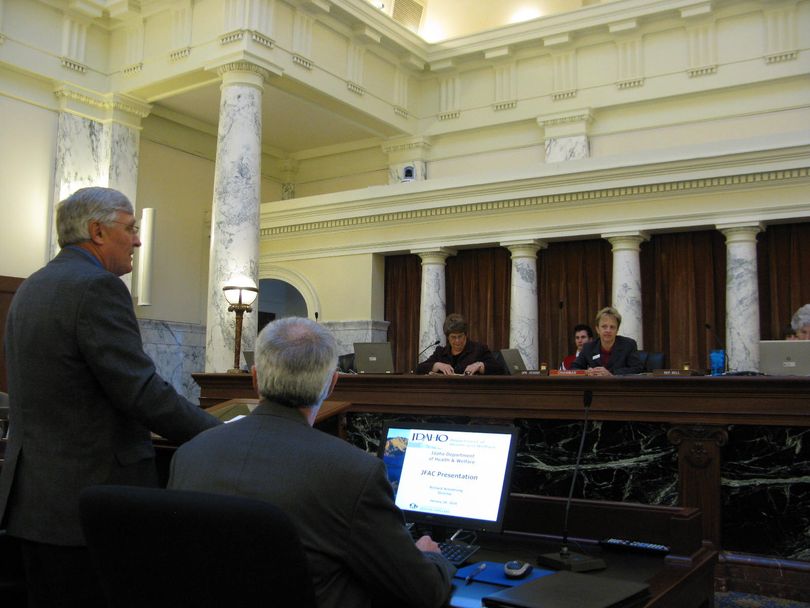H&W chief outlines PCAP proposal: ‘Not an entitlement program’

Idaho Health & Welfare Director Dick Armstrong is kicking off a week of health and human services budget hearings this morning, with an overview of the department’s budget issues. The overall budget proposed by Gov. Butch Otter for next year reflects a 6.2 percent increase from this year, but if maintenance items and the proposed new Primary Care Access Program are taken out, it’s only a 2 percent increase.
“Medicaid continues to be about 80 percent of our overall budget,” Armstrong told the Joint Finance-Appropriations Committee. “Last year it was 80.8 percent.” About 85 percent of the total appropriation for Health & Welfare “is paid to private service providers, primarily here in Idaho,” he said.
Armstrong outlined the PCAP proposal. “This is for Idaho adults who are in the ‘gap,’ who don’t qualify for Medicaid or a tax credit to purchase insurance,” he said. “They earn less than 100 percent of poverty, which is $980 a month for a single adult. Unlike us, they don’t have access to regular health care and suffer because of it. The impact can be tragic – poor physical and mental health, reduced capacity to work, homelessness and even premature death.”
He said, “PCAP can help address this disparity in our health care system. It is an all-Idaho initiative, with Idaho controlling the eligibility criteria.” He noted, “PCAP is not insurance, and does not provide comprehensive services, such as hospitalization or specialty care. Because of this, the county and state indigent programs are still necessary.”
He said the program would provide a “patient-centered medical home” to each of its enrollees, estimated at 75,000 of the 78,000 Idahoans who now fall into the coverage gap. That would mean “a team of practitioners in a primary care practice who take a proactive role in your health care and coordinate all your health care needs. … If you are due for a screening, they will contact and remind you. If you just got out of the hospital, they will provide your follow-up care.”
“Let me be clear: PCAP is not an entitlement program,” Armstrong told lawmakers. “Enrollment is subject to available funding. Also, participants are required to share costs and be actively engaged in their treatment plans. If not, they lose eligibility.”
When a patient enrolls, their primary care provider would conduct a health assessment, including their preventive, physical and mental health needs, and a treatment plan to address them. Basic medications, labs, X-rays and limited behavioral health services would be covered.
“One of the standards that patient-centered medical homes embrace is to offer extended hours and weekend appointments to expand their acute care capacity,” Armstrong said. “This can greatly reduce unnecessary emergency department use and hospitalizations.”
Chronic conditions account for more than 75 percent of health care spending today, Armstrong said. Coordinating care for those, including asthma, diabetes, heart disease, arthritis, depression and more, and managing them on the front end will prevent the need for more costly critical care and lead to better patient outcomes, he said.
However, if patients need critical care, they’d still be referred for it – even though it’s not covered under PCAP. “The costs of that treatment may end up being paid through the county-state indigent programs or as charity care from community organizations,” Armstrong told lawmakers.
He said if lawmakers approve PCAP, it’ll be implemented on Jan. 1, 2017.
“In my discussions with the governor, he’s been quite adamant that we do something this session for people caught in the health care gap,” Armstrong said. “I know and understand the difficulty in considering full Medicaid expansion. This is why we think PCAP is an achievable solution. Even better, it provides a foundation that we can build on for the future.”
Said Armstrong, “From my 40 years of experience with health care, I think PCAP can reduce health care costs for all of us. It also can provide our state with a more productive workforce, and improve the overall health of our communities.”
